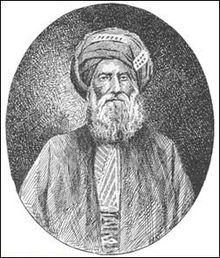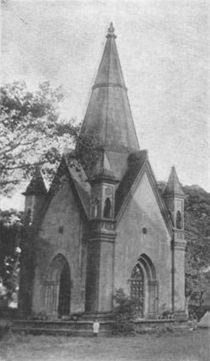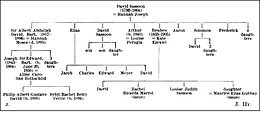- David Sassoon
-
David Sassoon 
Born October 1792
Baghdad, Ottoman IraqDied 1864-11-07
Poona, British IndiaOccupation Treasurer of Baghdad, businessman David Sassoon (October 1792 – November 7, 1864) was the treasurer of Baghdad between 1817 and 1829. He became the leader of the Jewish community in Bombay (now Mumbai) after Baghdadi Jews emigrated there.
Contents
Biography
Sassoon was born in Baghdad, where his father, Saleh Sassoon,[1] was a wealthy businessman, chief treasurer to the pashas (the governors of Baghdad) from 1781 to 1817, and leader of the city's Jewish community.
The family were Sephardim whose ancestors once lived in Spain. His mother was Amam Gabbai. After a traditional education in the Hebrew language, Sassoon married Hannah in 1818. They had two sons and two daughters before she died in 1826. Two years later he married Farha Hyeem (who was born in 1812 and died in 1886). The pair had six sons and three daughters.
Following increasing persecution of Baghdad's Jews by Daud Pasha, the family moved to Bombay via Persia. Sassoon was in business in Bombay no later than 1832, originally acting as a middleman between British textile firms and Gulf commodity merchants, subsequently investing in valuable harbour properties. His major competitors were Parsis, whose profits were built on their domination of the Sino-Indian opium trade since the 1820s.[citation needed]
When the Treaty of Nanking opened up China to British traders, Sassoon developed his textile operations into a profitable triangular trade: Indian yarn and opium were carried to China, where he bought goods which were sold in Britain, from where he obtained Lancashire cotton products. He sent his son Elias David Sassoon to Canton, where he was the first Jewish trader (with 24 Parsi rivals). In 1845 David Sassoon & Sons opened an office in what would soon become Shanghai's British concession, and it became the firm's second hub of operations.
In 1844, he set up a branch in Hong Kong, and a year later, he set up his Shanghai branch on the Bund to cash in on the opium trade.
It was not until the 1860s that the Sassoons were able to lead the Baghdadi Jewish community in overtaking Parsi dominance.[citation needed] A particular opportunity was given by the American Civil War, during which turmoil American cotton exports from the South declined. Lancashire factories replaced American cotton imports with Sassoon's Indian cotton.
Along with Parsi businessmen such as Jamshedji Jejaboy, David Sassoon continued the trade with China and from the wealth earned there he started his own business of oil. His first mill was named E.D. Sassoon Mills and he became exceedingly propserous. Later the Sassoons were the largest mill owners and were known as Badshah of the business community of Bombay. Overall there were 17 mills, each mill having around 15 to 20,000 workers. Later, David Sassoon also entered the cotton, fabrics and various other industries on a large scale.
David Sassoon, as an Orthodox Jew, continued his Jewish religious observances, observing the Jewish Sabbath throughout his busy life. He was also a member of the Legislative Assembly of the time. He built one of the largest and most beautiful synagogues of India, the Magen David synaguogue at Byculla, Bombay. He also built the Ohel David Synagogue of Pune. Today these are well known tourist attractions and form an important part of the cultural heritage of India. Various charity trusts were named after him and other members of his family, funded from his private income, which continue in existence today. David Sassoon one of the great people of Bombay who created so many monuments and educational institutions, building great buildings that have become the most prominent places of Bombay and Pune. He also constructed the Sassoon Dock at Colaba, one of the largest docks ever built in Bombay.
He lived with his family at Byculla's Bungalow which was in fact actually a Palace named Shin Sangoo. This was later donated to the Parsi Trust and is today's Massina Hospital. Nearby, the Victoria Garden (present day Rani Baugh) was also the property of the Sassoons and was donated to the Bombay Municipal Corporation for the construction of the Albert Museum, designed by the most prominent architect of the time. The interior is exactly like the Magen David synagogue of Mumbai and Ohel David synagoague of Pune. It also has the famous Victoria clock tower.
Legacy
Although David Sassoon did not speak English, he became a naturalised British citizen in 1853. He kept the dress and manners of the Baghdadi Jews, but allowed his sons to adopt English manners. His son, Abdullah changed his name to Albert, moved to England, became a Baronet and married into the Rothschild family. All the Sassoons of Europe are said to be descendants of David Sassoon.
He built a synagogue in the Fort (area) and another in Byculla, as well as a school, a Mechanics' Institute, a library and a convalescent home in Pune. David Sassoon was conscious of his role as a leader of the Jewish community in Bombay. He helped to arouse a sense of Jewish identity amongst the Bene Israeli and Cochin Jewish communities. The Sassoon Docks (built by his son) and the David Sassoon Library are named after him.
David Sassoon died in his country house in Pune in 1864. His business interests were inherited by his son Sir Albert Sassoon; Elias David had established a rival firm.
Some of the prominent Buildings build or contributed by David sasoon and their family are as follows
- David Sassoon Library & reading room, Fort Mumbai
- Jacob Sasooon High School, Byculla, Mumbai
- EEE Sassoon High School, Byculla, Mumbai
- David Sassoon Hospital, JJ Hospital Premises, Byculla, Mumbai
- Masina Hospital, Byculla, Mumbai
- Magen David Synagauge, Byculla, Mumbai
- Kenneseth Eliyahoo Synagogue, Colaba, Mumbai
- Sassoon Dock, Colaba, Mumbai
- Elphiston Technological School, Parel, Mumbai
- The Gateway of India
- The Bank of India, Fort (head office), Mumbai
- The David Sassoon Reformary and Deaf school, Matunga, Mumbai
- The Victoria Garden and Albert Museum (today's Rani naugh)
- Ohel David Synagogue, Pune
- Sassoon Hospital, Pune
- Lady Rachel Sassoon Dispensary, Pune
- David Sassoon Vridha Ashram, Pune
-
Sassoon Docks, in Mumbai
See also
References
- ^ The DNB gives "Sason ben Saleh".
- Chiara Betta 'Marginal Westerners in Shanghai: the Baghdadi Jewish community, 1845-1931' in Robert Bickers and Christian Henriot New Frontiers: imperialism's new communities in East Asia, 1842-1953 (Manchester University Press 2000: pp. 38–54), p.38ff.
- Oxford Dictionary of National Biography, Sassoon family
- Biography from the Tata Institute of Fundamental Research
- Jewish Encyclopedia.com
External links
Categories:- 1792 births
- 1864 deaths
- Indian Jews
- Indian businesspeople
- Indian philanthropists
- People from Baghdad
- Sassoon family
Wikimedia Foundation. 2010.



